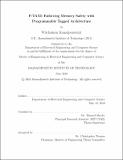P-TAXI : enforcing memory safety with programmable tagged architecture
Author(s)
Kamolpornwijit, Witchakorn
DownloadFull printable version (736.4Kb)
Alternative title
Programmable TAXI : enforcing memory safety with programmable tagged architecture
Enforcing memory safety with programmable tagged architecture
Other Contributors
Massachusetts Institute of Technology. Department of Electrical Engineering and Computer Science.
Advisor
Howard Shrobe.
Terms of use
Metadata
Show full item recordAbstract
Buffer overflow is a well-known problem that remains a threat to software security. With the advancement of code-reuse attacks and return-oriented programming (ROP), it becomes problematic to protect a program from being compromised. Several defenses have been developed in an attempt to defeat code-reuse attacks. However, there is still no solution that provides complete protection with low overhead. In this thesis, we improved TAXI, a ROP defense technique that utilizes a tagged architecture to prevent memory violations. Inspired by Programmable Unit for Metadata Processing (PUMP), we modified TAXI so that enforcement policies can be programmed by user-level code and called it P-TAXI (Programmable TAXI). We demonstrated that, by using P-TAXI, we were able to enforce memory safety policies, including return address protection, stack garbage collection, and memory compartmentalization. In addition, we showed that P-TAXI can be used for debugging and taint tracking.
Description
Thesis: M. Eng., Massachusetts Institute of Technology, Department of Electrical Engineering and Computer Science, 2016. This electronic version was submitted by the student author. The certified thesis is available in the Institute Archives and Special Collections. Cataloged from student-submitted PDF version of thesis. Includes bibliographical references (pages 104-112).
Date issued
2016Department
Massachusetts Institute of Technology. Department of Electrical Engineering and Computer SciencePublisher
Massachusetts Institute of Technology
Keywords
Electrical Engineering and Computer Science.